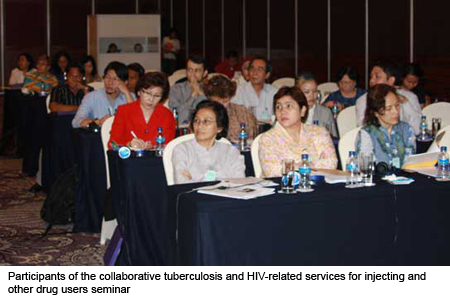Seminar on collaborative tuberculosis and HIV-related services for injecting and other drug users
 Jakarta (Indonesia), 24 November 2009 - Users of illicit drugs have high rates of infection both for HIV, mainly due to unsafe injecting behaviour, and for tuberculosis, whether they are living with HIV or not. Mindful of this reality and as part of the campaign leading up to World AIDS Day (marked every year on 1 December), the UNODC Country Office in Indonesia organized a one-day seminar to launch the Bahasa Indonesia version of the
Policy Guidelines for Collaborative TB and HIV Services for Injecting and Other Drug Users: An Integrated Approach, a recent publication by the World Health Organization (WHO), the Joint United Nations Programme on HIV/AIDS (UNAIDS) and UNODC.
Jakarta (Indonesia), 24 November 2009 - Users of illicit drugs have high rates of infection both for HIV, mainly due to unsafe injecting behaviour, and for tuberculosis, whether they are living with HIV or not. Mindful of this reality and as part of the campaign leading up to World AIDS Day (marked every year on 1 December), the UNODC Country Office in Indonesia organized a one-day seminar to launch the Bahasa Indonesia version of the
Policy Guidelines for Collaborative TB and HIV Services for Injecting and Other Drug Users: An Integrated Approach, a recent publication by the World Health Organization (WHO), the Joint United Nations Programme on HIV/AIDS (UNAIDS) and UNODC.
The seminar was held at the Hotel Indonesia Kempinski on 17 November. It was attended by over 90 participants from the Ministry of Health, the Ministry of Justice and Human Rights, the provincial public health authorities, the National AIDS Commission, the National Narcotics Board, the prisons, civil society, Family Health International/Indonesia, the HIV Cooperation Program for Indonesia, the Clinton Foundation, the University of Medicine, hospitals and primary care units.

Six speakers were invited to the event. In the morning, Jay Levy was the first to give his lecture. Dr. Levy is Professor of Medicine in the Division of Hematology/Oncology, Research Associate at the Cancer Research Institute and Director of the Laboratory for Tumor and AIDS Virus Research at the University of California at San Francisco, United States. Dr. Levy co-discovered US HIV isolate in 1983 and was nominated for the Noble Prize for Medicine in 2007. Also present were Nafsiah Mboi, Secretary of the National AIDS Commission, Asik Surya, Deputy Manager at the Ministry of Health, Samsuridjal Djauzi from the tuberculosis department at the University of Medicine, Abdullah Denovan, National Coordinator of the Indonesian network of people living with HIV, and Oscar Barreneche, WHO Team Leader/Medical Officer for HIV/AIDS in Indonesia. US HIV isolate in 1983 and was nominated for the Noble Prize for Medicine in 2007. Also present were Nafsiah Mboi, Secretary of the National AIDS Commission, Asik Surya, Deputy Manager at the Ministry of Health, Samsuridjal Djauzi from the tuberculosis department at the University of Medicine, Abdullah Denovan, National Coordinator of the Indonesian network of people living with HIV, and Oscar Barreneche, WHO Team Leader/Medical Officer for HIV/AIDS in Indonesia.
In the afternoon, participants worked in small groups to brainstorm on how to achieve multisectoral coordination using existing mechanisms wherever possible. The many ideas generated will become the basis for the development of the Indonesian guidelines for collaborative tuberculosis and HIV-related services for drug users.
The seminar was not meant to be a one-off event but, rather, a starting point for the work that must be done to make sure that service providers coordinate more and thus respond better to drug users' need for universal access to prevention, treatment and care.
 Jakarta (Indonesia), 24 November 2009 - Users of illicit drugs have high rates of infection both for HIV, mainly due to unsafe injecting behaviour, and for tuberculosis, whether they are living with HIV or not. Mindful of this reality and as part of the campaign leading up to World AIDS Day (marked every year on 1 December), the UNODC Country Office in Indonesia organized a one-day seminar to launch the Bahasa Indonesia version of the
Policy Guidelines for Collaborative TB and HIV Services for Injecting and Other Drug Users: An Integrated Approach, a recent publication by the World Health Organization (WHO), the Joint United Nations Programme on HIV/AIDS (UNAIDS) and UNODC.
Jakarta (Indonesia), 24 November 2009 - Users of illicit drugs have high rates of infection both for HIV, mainly due to unsafe injecting behaviour, and for tuberculosis, whether they are living with HIV or not. Mindful of this reality and as part of the campaign leading up to World AIDS Day (marked every year on 1 December), the UNODC Country Office in Indonesia organized a one-day seminar to launch the Bahasa Indonesia version of the
Policy Guidelines for Collaborative TB and HIV Services for Injecting and Other Drug Users: An Integrated Approach, a recent publication by the World Health Organization (WHO), the Joint United Nations Programme on HIV/AIDS (UNAIDS) and UNODC.
